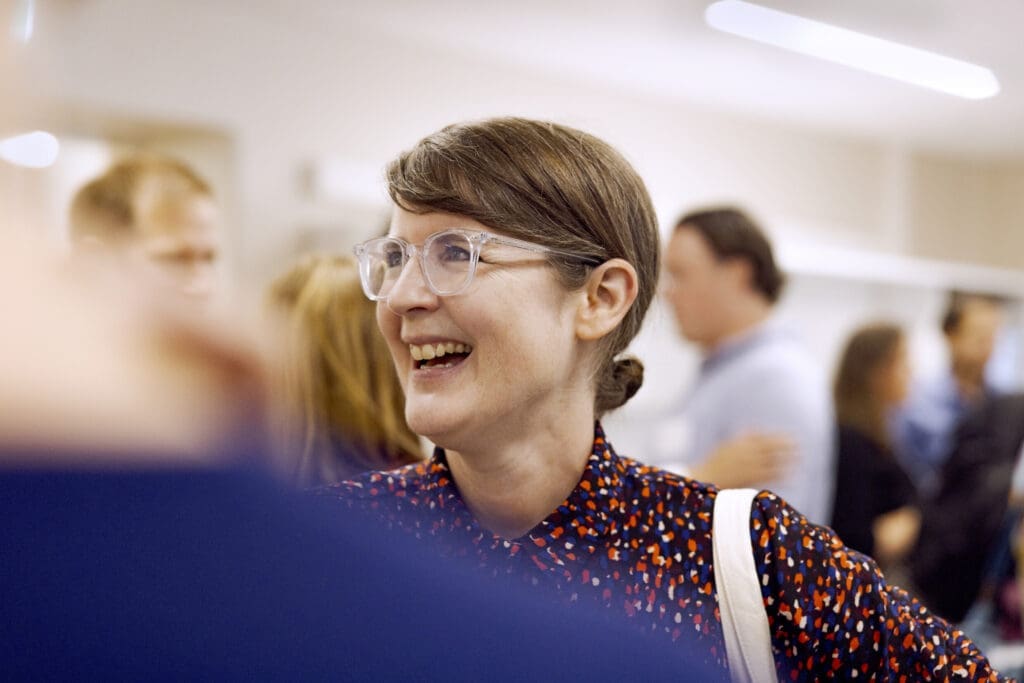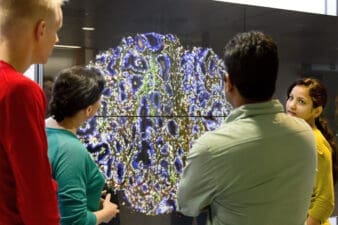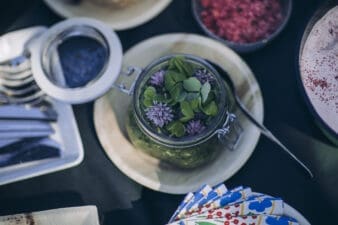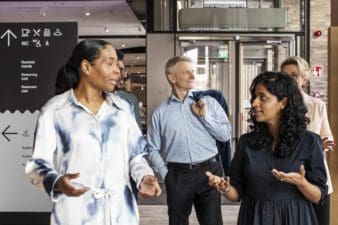5 future foodtech trends from Helsinki
Explore Helsinki’s top foodtech innovations, which benefit the global food industry in sustainability, efficiency, and health.

6 min read
- Helsinki hosts nearly 100 foodtech startups focusing on innovative and sustainable food solutions, including plant-based proteins and eco-friendly packaging.
- The Finnish foodtech sector, emphasizing sustainability, aims for carbon neutrality and major greenhouse gas reduction by 2035, underpinned by stringent food regulations.
- Helsinki’s foodtech innovation is powered by a strong startup ecosystem, leading research institutions, strategic location, and a commitment to sustainability and health.
- Helsinki leads in foodtech advancements like cellular agriculture, smart packaging, 3D food printing, and vertical farming, contributing to global food security and sustainability.
Finland is home to nearly 100 foodtech startups, in categories from food delivery to plant-based protein alternatives and sustainable packaging. Helsinki is at the forefront of the industry, with significant growth seen in recent years. Between 2015 and 2022, 80 investments were made in 47 different foodtech startups, with a median investment size of just under two million euros.
Finnish foodtech companies are known for prioritising sustainable food production, developing innovations to combat climate change and increasing global food security. This commitment aligns with the country’s stringent food regulations (the strongest in the world) and the Finnish food industry’s goal of achieving carbon neutrality and reducing greenhouse gas emissions by 75% by 2035.
What makes foodtech innovation so powerful in Helsinki?
- Support from the strong startup ecosystem is the foundation for success
- Access to top-notch research institutions and R&D, like the University of Helsinki and VTT Technical Research Centre of Finland
- Strategic location: Finland is located close to many key food-producing countries
- Substantiation of sustainability and climate effects
- Awareness of health, wellness, and dietary needs
Helsinki offers ample investment opportunities and supports startups to commercialise their research through public-private partnerships. With government funding and research partnerships between companies and universities, foodtech innovations can be tested and adopted by the public and scaled up around the globe to solve some of the world’s biggest challenges.
In this article, we’ll dig into what’s cooking in Helsinki’s foodtech scene, and uncover Helsinki’s innovative contributions to this growing sector.
1. Cellular agriculture
Finland has a rich history of food research and development by different institutions and big corporations. The country is a world leader in cellular agriculture—the use of cell culture techniques in food production without fields or animal farming. As nature and biodiversity decline globally, cellular agriculture plays a key role in solving the global food and climate crisis.
The VTT Technical Research Centre of Finland has long recognised the potential of cellular agriculture, and many Finnish foodtech companies have developed more ethical, local, and sustainable ways to produce food in the future. For example, the world’s first mycoprotein product, PEKILO® by eniferBio, was originally developed in Finland back in the 1970s. Valio’s investment in eniferBio supports the commercialisation of this alternative protein, which turns today’s waste into a high-value ingredient.
One leader in cellular agriculture is Solar Foods, a foodtech startup built upon the research of two Finnish universities. The company farms single-cell organisms to produce high-protein food ingredients from thin air. Its product, Solein®, is a sustainable, nutritious, and carbon-neutral microbial protein that can be produced independently from soil, weather, and climate.
Another Helsinki-born innovation is Onego Bio’s product: an animal-free egg white created using the precision fermentation process. Onego Bio is a spin-off startup from VTT, which provided the company with an exclusive licence for the IP and incubation at its LaunchPad.
The increase in the larger funding rounds of recent years, needed for scaling both business operations and production, indicates that also Finnish companies, such as enifer and Onego Bio, are addressing the huge global challenges of food production
Jan-Patrick Haikkola, Investment Manager at Tesi
2. Smart packaging
Helsinki values circularity and eco-friendliness. There’s a growing demand for smart and sustainable packaging in the food industry, with 73% of consumers willing to pay more for eco-friendly packaging, according to a Trivium Packaging report,
Finland’s dedication to sustainable innovation shines through in its development of circular packaging and new materials. Smart packaging is biodegradable and offers extended shelf life, keeping food fresher for longer. It also reduces food waste, carbon emissions, and the loss of biodiversity.
With 75% of Finland covered by forest, wood-based industries are deep-rooted in Finnish society. And as one of the most innovative countries in the world, Finland offers unique wood-based innovations to replace plastic packaging.
Finland offers packaging solutions, which are mainly based on sustainably produced wood biomass and pulp as well as other fibres and recyclable materials, to replace traditional plastic packaging. Our Finnish companies are known for the high quality and the wide spectrum of products meeting different industry-specific needs and most of these products are already available internationally.
Heidi Kokki, Sustainable Packaging Lead at Business Finland
Pioneering companies in Helsinki include Sulapac, which provides a sustainable alternative to plastic packaging that is both beautiful and functional. The company has won several sustainability awards, and all Sulapac materials for food services biodegrade fully without leaving permanent microplastics or toxic loads behind.
Paptic®, headquartered in Espoo, offers the ideal solution for replacing plastics in dry food packaging. With heatsealable, fibre-based, recyclable, and biodegradable material, Paptic protects dry food in a sustainable way.
3. 3D food printing
Used to create customised and appealing food products, 3D printing is an emerging foodtech innovation that improves the accuracy and consistency of food production. 3D printing technology is disrupting the alternative protein landscape, allowing companies to create plant-based products that are superior in taste and texture to other products on the market.
VTT is at the forefront of the 3D food printing revolution, with dedicated teams collaborating to develop customised multi-textural snack foods. Several restaurants in Helsinki have started offering 3D printed cuts of “meat” that are made from vegetable proteins, which have been well-received from customers. In Finland, plant-based protein foods continue to take market share from animal-based products.
4. Data-driven food safety
With the global food supply chain becoming increasingly complex, the food industry is using more data-driven solutions and artificial intelligence (AI) to analyse large amounts of data with the aim to improve food safety, detect contamination, and reduce foodborne illnesses.
Finland topped the 2022 Global Food Security Index, and has some of the strictest food safety regulations in the world. Striving to prevent potential public health crises, the Finnish Food Authority (FFA) uses AI to reduce the time it takes to complete critical research and address issues in real-time. AI technology proved invaluable when the FFA was working on a project to understand the factors influencing risks from the avian flu.
5. Vertical farming
Vertical and indoor farming optimise food production in highly controlled, limited environments. Controlled environment agriculture (CEA) reduces food insecurity by producing greater amounts of products in year-round operations, with a smaller impact on the environment compared to traditional farming.
Helsinki is perfect for urban farming solutions. We already have commercial vertical farms, greenhouse cultivation is highly developed and consumer behaviour is motivated by sustainability issues.
Laura Forsman, Manager, Viikki Food Design Factory
The Viikki Food Design Factory at the University of Helsinki and Metropolia Urban Farm Lab are two spaces in Helsinki that nurture sustainable innovation in food systems. Natural Resources Institute Finland (Luke) has also developed and patented a vertical farming solution that enables the production of high-wire crops in vertical farming.
Helsieni is a pioneer of urban modular mushroom farming in Finland. Implementing circular economy principles, the startup uses coffee ground waste from restaurants, offices and cafés to grow first-class fresh mushrooms, which they supply to chefs, restaurants, and catering services.
Additionally, many vertical farms around the world are powered by Finnish-based company iFarm, a fully-automated hydroponic vertical farming solution for salads and herbs. With iFarm’s automated climate control, smart power control, and proprietary LED lighting, crops ripen twice as fast as outdoors.
Helsinki: A top location for foodtech investment and development
Helsinki leads the way in foodtech innovation, offering ground-breaking solutions that benefit not only Finland but the global food industry in sustainability, health, and efficiency. With a focus on improving global food security for the betterment of humankind, Helsinki fosters a collaborative environment where public-private-people partnerships thrive.
The Helsinki foodtech ecosystem supports easy entry and setup for businesses, access to public funding, and opportunities for research and development with leading institutions. Leveraging the “made in Finland” quality stamp and the country’s positive image, businesses can easily expand globally. What’s more, Finland’s population demonstrates early adaptability to innovations and a keen interest in personalised health and nutrition through foodtech advancements.
Want to learn more about what Helsinki has to offer?
If you’re an innovative high-tech fast growing foodtech company interested in expanding to Helsinki, our Senior Advisor Maria Melnikova can help you find the information you need to make the right decision for your business.
Learn more about the 90 Day Finn Program
Experience the Helsinki business ecosystem like a local. Immerse yourself in the world’s happiest country and experience a unique blend of professional growth and personal fulfilment.



